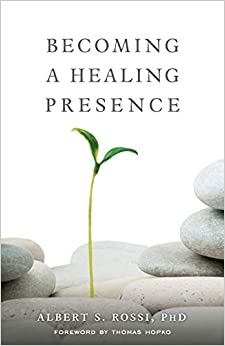Tonight we will be looking at Chapter 7 “The Sacrament of the Present Moment” of Dr. Albert S. Rossi’s book Becoming a Healing Presence. Dr. Rossi calls “being in the present moment” a “sacrament.” Today, the church generally defines the word “sacrament” as the “outward and visible sign of an inward and spiritual grace.” 1979 BCP 857. For example, in baptism, the outside sign is water and the Trinitarian invocation, and the inward grace is “union with Christ in his death and resurrection, birth into God’s family the Church, forgiveness of sins, and new life in the Holy Spirit.” 1979 BCP 858. But this formal definition of a sacrament in which the sign merely signifies, represents, or conveys the grace only dates from about the 11th century as the medieval Scholastics sought to rationally explain the faith. And the limitation of the sacraments to only seven dates only to Peter Lombard’s “Sentences” in 1150 as medieval rationalism sought to catalogue and systematize Christianity.
Dr. Rossi’s definition of “sacrament,” however, draws on a more expansive and deeper understanding of sacrament that was found in the early Church. For the early Church, sacraments transcended rational thought and definition. This more ancient understanding of sacrament does not recognize the separation of the sign from that which it signifies. Rather the sign fully embraces, communicates, and manifests that which is signified, allowing the recipient of the sign to fully participate in that which is signified. Therefore, for example, in the early church baptism does not represent a dying and rising with Christ, but baptism is our dying and rising with Christ. The mechanics of how this occurs is simply a mystery.
Additionally, this more ancient understanding of a sacrament includes anything that communicates and manifests God’s grace. For example, Origen of Alexandria (184-253) taught that Scripture reading was sacramental because Christ, the eternal Word, is present in and encountered and even consumed in the words of the text, and the text itself can affect a spiritual transformation in the Christian reader. St. Maximus the Confessor (590-662) taught that creation itself was a sacrament because “The heavens declare the glory of God” (Psalm 19:1), and as we participate in creation so we participate in God. For tonight think about how the present moment is sacramental. How does being present make us one with God’s grace?
Dr. Rossi opens this chapter with a quote from Alexander Schmemann’s For the Life of the World: “The Orthodox understanding of sacrament is a mystery, which is more than a sign but rather ‘something becoming what it is,’ ‘a dynamic synthesis of symbol and fulfillment.'” (p. 109). I have attached the relevant excerpt from Dr. Schmemann’s book. If you don’t quite grasp Dr. Schememann’s thoughts, I don’t either.
Dinner is at 6. Menu is chicken divan. Discussion about 6:45. Hope to see you here.
Moses led his flock beyond the wilderness, and came to Horeb, the mountain of God. There the angel of the Lord appeared to him in a flame of fire out of a bush; he looked, and the bush was blazing, yet it was not consumed. . . God called to him out of the bush, “Moses, Moses!” And he said, “Here I am.” Then he said, “Come no closer! Remove the sandals from your feet, for the place on which you are standing is holy ground.” . . . God said to Moses, “I am who I am.”
Exodus. 3:1-5, 14.

